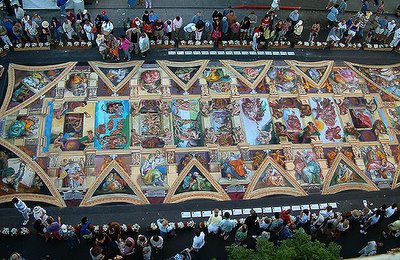Parents, Seen and Unseen
This happened to me twice last week. First, with my father. He and I were helping my mother study for the admission exam for nursing school; being a nurse is my mother's oldest ambition). While we pored over fractions and the multiple meanings of gondola, he looked up suddenly and said, smiling at my mother, "You know, even if you don't end up going to nursing school, I'm so happy you're studying. I'm so happy to see you learn things." This from my father, the ultimate workaholic, the fiercest, most ambitious overachiever I know. This from a man who insists that the most important thing in life is to be successful -- to be respected and admired by other people because of all the things you have and all the things you can do.
It threw me for a loop, I have to say. It occurred to me, as I was struggling to place what he said in the context of what I knew him to be, that maybe, just maybe, he isn't as disappointed as I believe him to be when he thinks about my life and what I've chosen to do with it. Maybe he isn't mortified. Maybe he isn't ashamed. Maybe my lack of success doesn't hurt him so much. Maybe he is happy that I'm learning, happy that I'm challenging myself intellectually even if the outcome of that isn't fame or great sums of money.
And then, a surprise from my mother. I found out yesterday, during our usual Sunday lunch, that she's been secretly making inquiries about vegan mayonnaise to prepare a vegetable salad I love and haven't been able to eat since I became a vegan. She announced triumphantly as we helped her set the table, "Vegetarian food for everyone today!" She'd made white bean soup with dill, creamed spinach with soy milk, bought Earth Balance to spread on toast. No meat to speak of on the table. I was so moved. So often, all I hear my mother say is how crazy she thinks I am because I'm a vegan now. I hear that even when what she's really saying is that it's okay, it's my body, it's my life. My idea of my mother doesn't include tolerance, doesn't include support for choices I make that she doesn't understand. It doesn't include her buying soy milk and vegan butter.
I feel humbled and a bit awed. It's humbling to have my assumptions about my parents unsettled; it's amazing to realize that my parents are people who can change, who are capable of generosity of mind. They still have a thing or two to teach me. I'm glad that I haven't forgotten how to learn.



